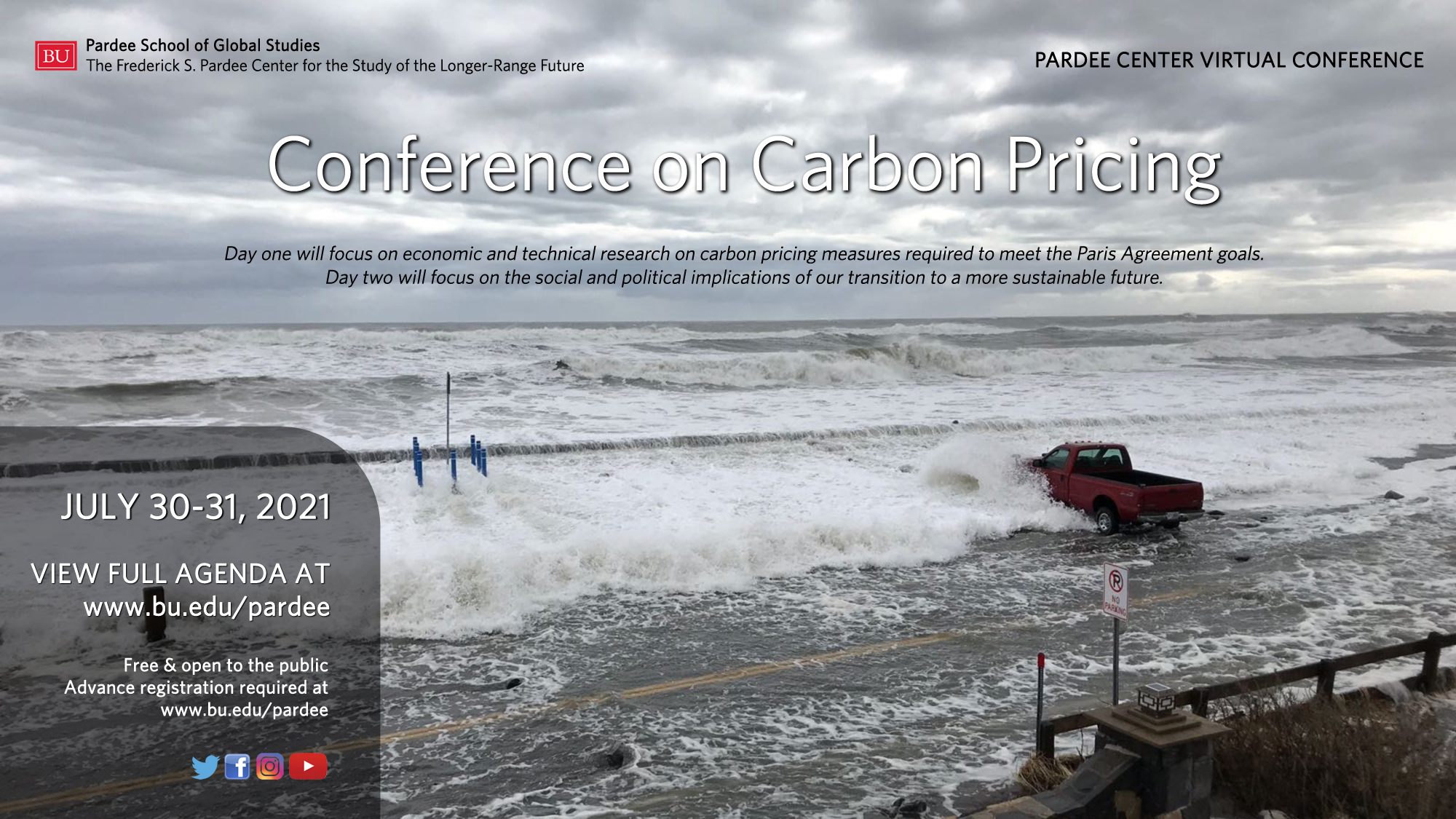Pardee Center Hosts Two-Day Conference on the Future of Carbon Pricing

On July 30 and 31, 2021, the Frederick S. Pardee Center for the Study of the Longer-Range Future at Boston University’s Pardee School of Global Studies hosted a two-day virtual conference of panels and keynote addresses exploring the future of carbon pricing. The first day, which featured a keynote address by Geoffrey M. Heal (Professor of Social Enterprise, Columbia University Business School), focused on economic and technical research on carbon pricing measures required to meet the Paris Agreement goals of a 1.5° to 2.0° C rise in global temperatures. The second day, which featured a keynote address by Matto Mildenberger (Associate Professor of Political Science, University of California at Santa Barbara), focused on the social and political implications of our transition to a more sustainable future.
The conference was convened by Jim Stodder, a Visiting Professor of the Practice at Boston University’s Metropolitan College, and was the culmination of his work as a Pardee Center Faculty Research Fellow.
Video recordings of every session are available below.
First Keynote Address: The Economics of the Energy Transition
What does economic theory tell us is required for environmental stewardship?
Geoffrey M. Heal, Professor of Social Enterprise, Columbia University Business School
Discussant: Jim Stodder, Visiting Professor of the Practice in Administrative Sciences, Boston University
Second Keynote Address: The Politics of Carbon Pricing
Why redistributive arrangements within countries, rather than conflict between them, might be the key to building viable climate policies.
Matto Mildenberger, Associate Professor, Department of Political Science, University of California at Santa Barbara
Discussant: Adil Najam, Inaugural Dean, Pardee School of Global Studies, Boston University
PANEL I: Estimates and Forecasts of Carbon Tax Impact
What can economic models tell us about the design and impacts of carbon taxes?
GDP Effects of EU Carbon Taxes
James H. Stock (Harvard University) and Gilbert Metcalf (Tufts University)
Carbon Taxes and Macroeconomic Stimulus
Jim Stodder (Boston University) and Ivan F. Julio (Boston University)
Regional Carbon Pricing, and Other Policies to Promote Equity and Wellbeing
Mark Budolfson (Rutgers University) and Francis Dennig (Yale-NUS College)
Moderator: Bahar Erbas (Boston University)
PANEL II: Challenges & Opportunities for a Carbon Tax
Most economists agree that carbon pricing is necessary to combat climate change. But is it enough?
Country-Level Social Cost of Carbon
Katharine Ricke (University of California, San Diego)
Carbon Policy and the Emissions Implications of Electric Vehicles
Stephanie M. Weber (Yale University)
Misleading Metrics and the Importance of Methane
Robert Kleinberg (Boston University; Columbia University)
The Role of Financial Markets in Price Discovery and Allocation of Climate Change Risk
Alessandro Cocco (Chicago Federal Reserve) and Nahiomy Alvarez (Chicago Federal Reserve)
Moderator: Irena Vodenska (Boston University)
PANEL III: Distributional Issues Within Countries
What policies can address within-country inequalities around carbon pricing?
Carbon Tax Regressivity and Underlying Inequality
Giles Atkinson (London School of Economics) and Julius Andersson (London School of Economics)
Tax Incentives for Green Consumption
Christian Gelleri (University of Würzburg, Germany)
The Political Economy of Carbon Dividends
Mark Paul (New College of Florida)
Moderator: Jacqueline Ashmore (Boston University)
PANEL IV: Distributional Issues Between Countries
Unprecedented global cooperation is clearly required. But is it possible?
When and Where Do International Commitments Matter?
Liam Beiser-McGrath (University of London)
Obstacles to Rainforest Preservation
Dale Ballou (Vanderbilt University)
Internalizing Externalities Across Spatial and Temporal Scales
Kian Mintz-Woo (University College Cork, Ireland; Princeton University)
Climate Clubs: Growth and Stability
Detlef Sprinz (PIK – Potsdam Institute for Climate Impact Research, Germany) and Håkon Sælen (CICERO Center for International Climate Research, Norway)
Moderator: Chiara Margaria (Boston University)
 The Economics of the Energy Transition
The Economics of the Energy Transition The Politics of Carbon Pricing
The Politics of Carbon Pricing Jim Stodder (Boston University)
Jim Stodder (Boston University)